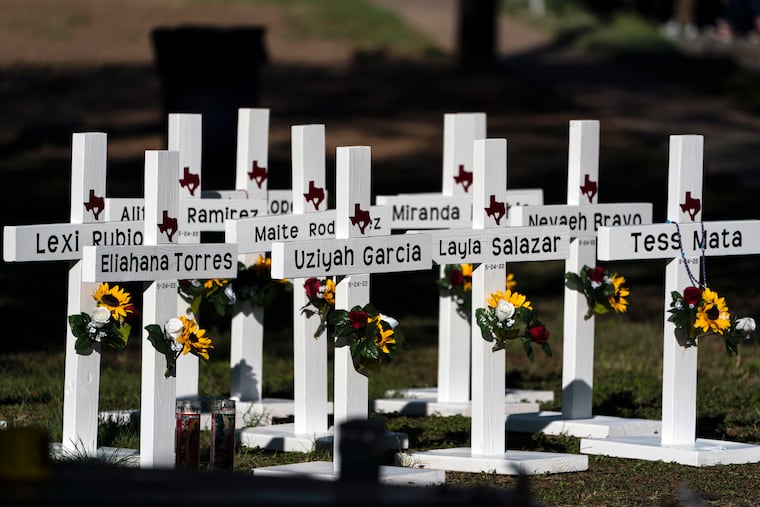Why the war on gun violence is also a battle against systemic inequality
The same systems that foster disparities in health, wealth, housing, and employment also create people who believe their only recourse is a gun, writes Solomon Jones.

After celebrating Memorial Day — a day in which we honor those who gave their lives during America’s wars — it struck me that we are in the midst of yet another war. It is a war for the soul of our country, and it is being fought on our streets, in our schools, in the aisles of our grocery stores, and inside our houses of worship.
Guns are at the center of this war. As we mourn a father and son gunned down during Philadelphia’s bloody holiday weekend, or rage over the 19 children and two teachers shot dead in a school in Texas, or grieve the 10 Black people killed in a Buffalo, N.Y., grocery store, we spar to decide if our right to guns is more important than our right to live.
There are passionate arguments on both sides of the debate. Does the Second Amendment mean that every individual has the unlimited right to own guns, or does it mean that there should be state militias that are well-regulated by the government? Whatever the meaning, one thing is clear: We’re not using guns to kill America’s enemies. We’re using them to kill each other. Therefore, if we are to win this war, we must first recognize that guns are merely the weapons we’ve chosen. The enemy we’re fighting is systemic inequality.
After all, systemic inequality creates the underfunded schools that produce criminals. It also creates communities without adequate resources and disparities in health, wealth, housing, and employment. Perhaps most damning, systemic inequality creates people who believe that their only way out of their current situation is with a gun.
» READ MORE: How my family was reminded of the gun violence that many in the city live with every day | Solomon Jones
Perhaps under other circumstances, the carnage we’ve seen in this war would be labeled as atrocities. But we seem to have normalized gun violence in America, especially when it comes to the impoverished or people of color. It’s almost as if we expect certain people to shoot each other, and I believe that’s because we’ve come to expect inequality.
When 562 people were murdered in Philadelphia in 2021, and the victims were mostly Black and male, the outcry in some quarters was relatively muted, because we live in a society that has trained us to believe that Black men are violent and thus deserving of such a fate. We have also come to expect that the shooters in such cases will not be brought to justice.
The numbers bear this out. The Inquirer found that between 2015 and 2020, nearly 2,700 young Black men were wounded in shootings, but suspected shooters were convicted in only 6% of those cases. When young white men were shot, their shooters were three times as likely to be convicted.
That’s inequality, and it’s baked into America’s criminal justice system.
Systemic inequality created alleged Buffalo shooter Payton S. Gendron. Not because he was a victim of inequality, but because he was a beneficiary. He believed a white supremacist conspiracy theory known as the great replacement theory, which says that Jews and liberals are conspiring to consolidate political power by replacing white people with Black people and nonwhite immigrants. As a white male, he believed it was incumbent upon him to hold his place of privilege through gun violence.
» READ MORE: Buffalo shooting illustrates the persistence of white supremacy
School shooters such as Salvador Ramos, the suspect in the murders of 19 students and two teachers in a Texas elementary school, are also created by systems of inequality. Far too often, they’re looking to be recognized in a society based on fame, to escape from bullies in a society that promises love, to experience success in a society that’s doomed them to failure. They are searching for a way to matter, and they think they can do it with a gun.
If everyone believed America’s system was meant to help them, you wouldn’t see this kind of gun violence. But because so many can see the inequality, they ignore the rules that keep them at the bottom.
So how do we fix it? How do we honor those who’ve died in America’s war against gun violence? We honor them by giving them a chance to make it. We honor them by keeping America’s promise and making our country a place where men and women are not only created equal but have an equal opportunity for success.